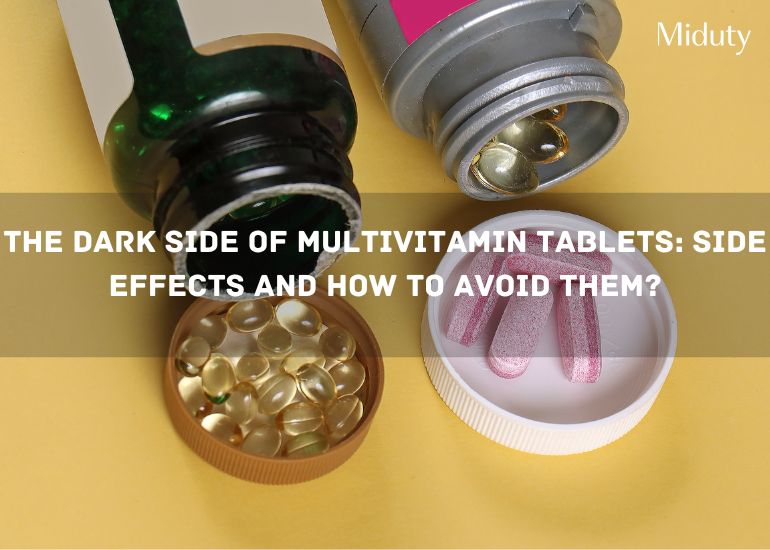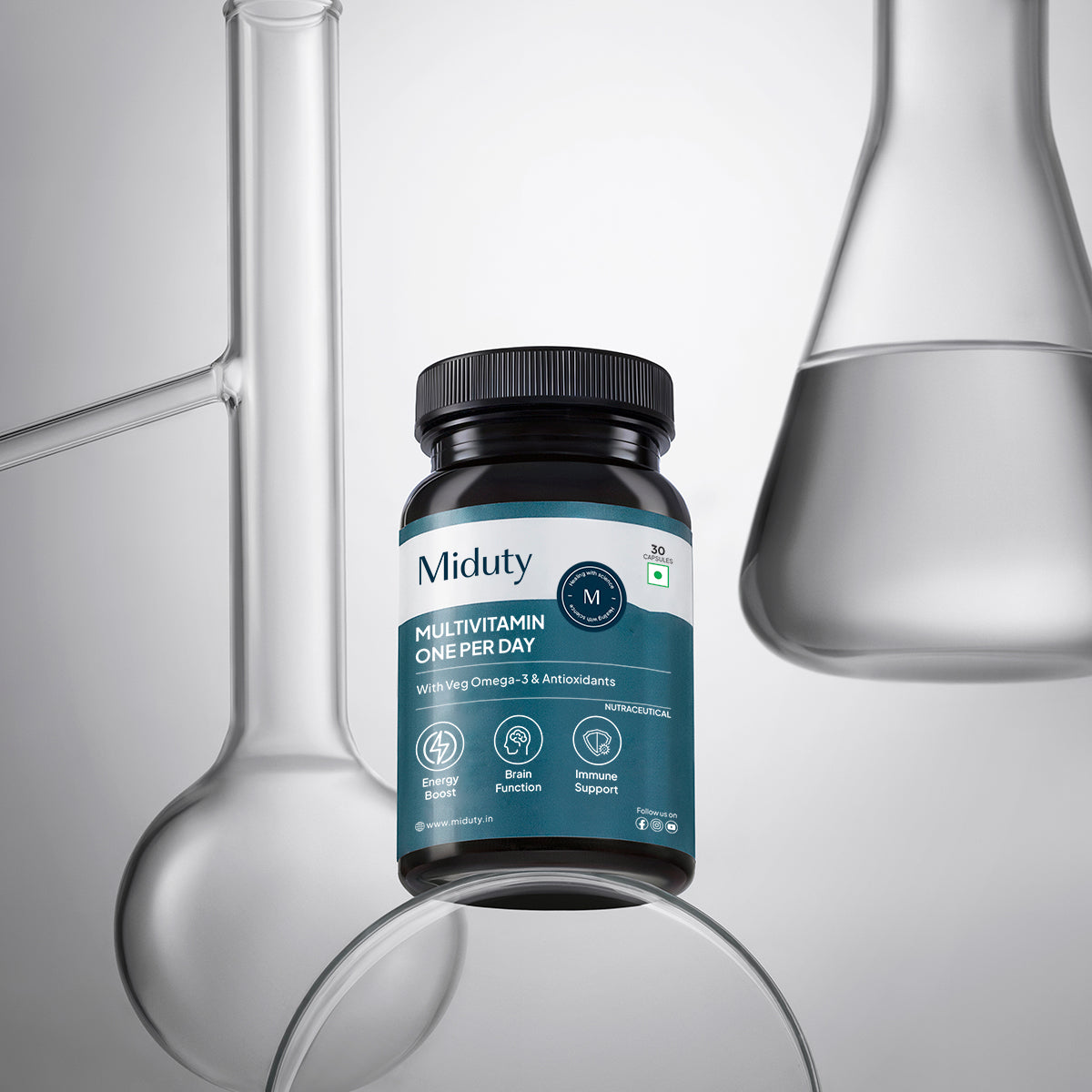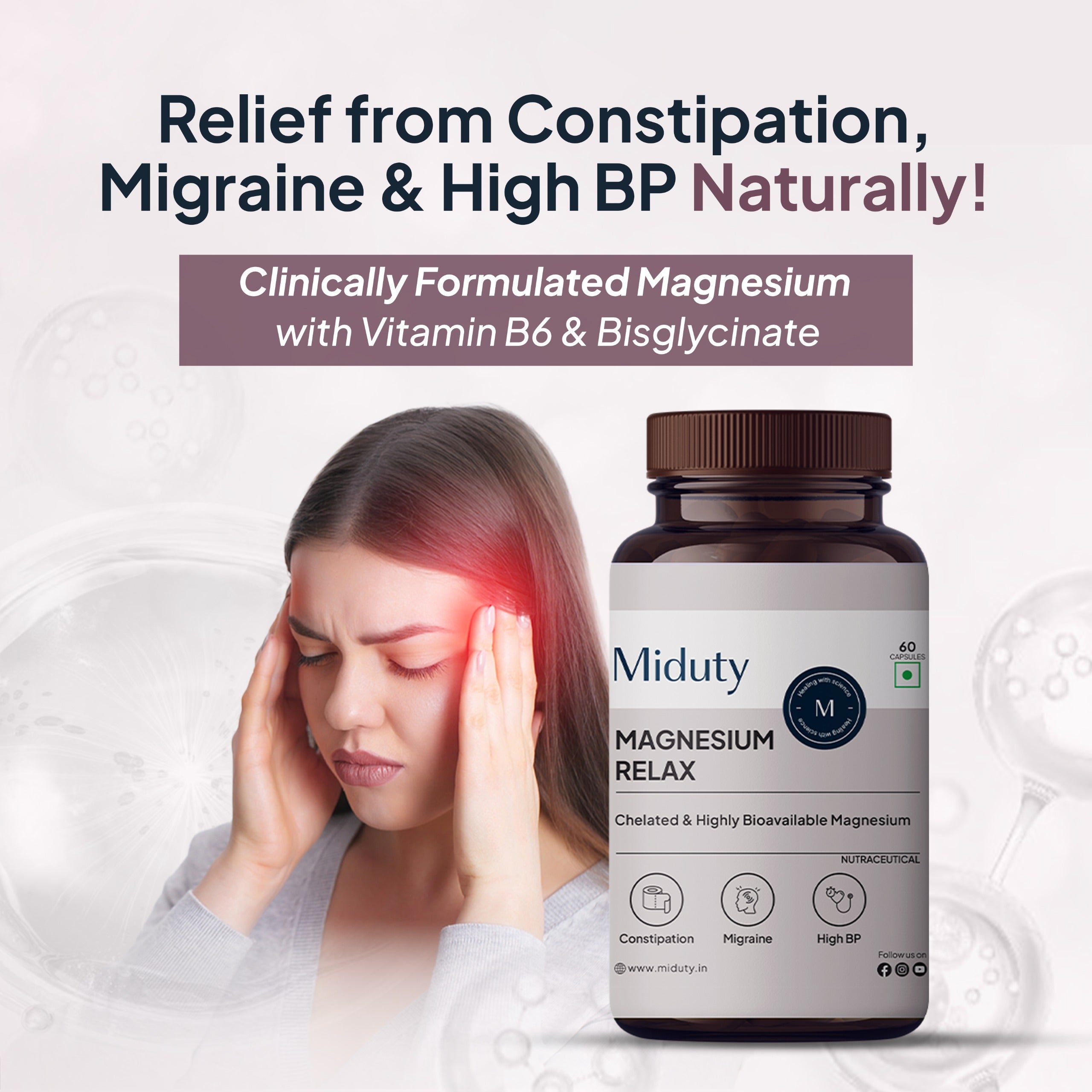
The Dark Side of Multivitamin Tablets: Side Effects and How to Avoid Them?
Key Takeaways
1. Multivitamins ≠ Magic Pills. They can help—but they can’t replace a nutrient-rich, whole food diet.
2. Not All Supplements Are Equal. Cheap forms, wrong dosages, and poor absorption make many multivitamins ineffective or even harmful.
3. Soil Depletion = Fewer Nutrients in Food. Modern farming has stripped our food of essential nutrients, making supplementation more necessary than ever.
4. Watch for Side Effects. Overdosing, poor combinations, and drug interactions can lead to headaches, digestive issues, or worse.
5. Form Matters, Always Read the Label. Capsules beat tablets, and bioavailable forms like methyl B12 and folate are non-negotiable for real results.
With all the awareness created around disease prevention, many have started taking multivitamins and mineral supplements to improve their health. While taking supplements can be healthy, people often believe they can replace a healthy diet and there aren't always warnings about taking too much of these supplements which can lead to multivitamin side effects
I have done a lot of research and in this article, I'll be sharing it with you. The side effects of multivitamin supplements, the dangers of taking too much, and which are necessary, everything you need to know about taking vitamin and mineral supplements.
It is always healthier to get the nutrients you need from a healthy diet as opposed to taking vitamin supplements. The nutrients in the food that we eat are superior to those in supplements. Our bodies absorb the nutrients from the food better than the supplements because they are more bio-available, meaning they are easier for our bodies to absorb.
But the fact is that our foods do not have the nutritional content that they used to and our busy lives often get in the way. Not taking time to cook or buy real food. Bad Cookware, and depleted soil nutrients, all put a burden on our biology.
Why We Need Extra Vitamins?
While it's not impossible to get all the nutrients you need from food, particularly a wide variety of healthy whole foods, it can be quite hard. All your meals would need to consist of minimally or completely unprocessed foods and your meals are big and filled with more vegetables and other healthy options than most people are comfortable eating in one sitting.
You might need to eat all day long! To have the right amount of nutrients a healthy body needs, 7-9 servings of vegetables each day, which is not possible, so we need extra nutrients from outside.
Environmental Problems And Large-Scale Industrial Farming:
The quality of the soil is no longer what it was. The high demand for food and the lack of space for agricultural land has resulted in the overuse of the soil. The nutrients have been depleted to such an extent that farmers now have to fertilize the soil.
Unfortunately, the fertilizer doesn't contain enough nutrients to replace all the lost nutrients. Due to this all the crops and animals are nutrient deficient.
This means that the food that you eat, whether it's meat, dairy, or fruits and vegetables, and even grains are no longer the excellent sources of nutrients that they used to be. A lot of the crops are now also genetically modified (GMO) Often this is done to produce more than normal yields or to protect the crops from the environment. The structure of the plants is no longer natural. While this isn't always a bad thing as such, in some cases, these GMO crops irritate some people's digestive systems or cause inflammation.
This means that those foods need to be cut out of their diets, some of them are staple foods like corn and wheat. Our bodies and our minds just do not function at their full capacity without having all our nutritional needs met. Not only this, but nutritional deficiencies can cause diseases. If you aren't able to eat a very healthy and varied diet all the time, have certain dietary restrictions or if you do not have access to good quality food items, you won't be getting all you need from your diet.
Other Factors Influence How Much Nutrition We Get:
Some constantly travel and it is harder to find nutritious food on the go. Certain dietary restrictions can make it hard for people to obtain all the nutrients they need.
One example of this is those who follow a vegan diet or in the cases where vegetarians don't eat enough eggs or dairy. Vitamin B12 in proper amounts is only found in animal products. Unless the foods they eat are fortified with the right kind of vitamin B12, they will need to take a supplement.
People with food allergies also have to cut out the foods that trigger their allergy which can make them deficient in certain nutrients if there aren't food alternatives rich in those nutrients for them.
If you are trying to fall pregnant, are pregnant, or are breastfeeding, your doctor may recommend a supplement. You are now caring for two so your body requires more of most nutrients than when you aren't pregnant or breastfeeding. A supplement is a good way to make sure that you and your baby are both getting all the nutrients that you need.
The Reality of Most Multivitamin Tablets on the Market

1. Cheaply Produced Formulations
To keep costs low and revenue high, many multivitamin manufacturers add mostly cheap and often ineffective forms of the nutrients with only the barest minimum of the more expensive, better quality, more effective forms of the nutrients which can often lead to multivitamin side effects.
2. Poor Formulation
In addition to poor quality forms of the nutrients in formulations, the nutrients are often also in incorrect amounts or ratios. They are unbalanced and you may be getting too much of some nutrients which can be harmful and not enough of some which also affects your health badly.
3. Incorrect Form
The different forms of the nutrients have different bioavailabilities. A good example of this is how many vitamin B12 supplements are made of cyanocobalamin, but the body doesn't absorb this form of B12. The correct form is called methylcynocoblamin or Hydroxycobalamin. Same goes for folic acid, you should be consuming folate and not folic acid. This is especially important if you are pregnant or trying.
Formulations of Other Important Supplements to Look for
Magnesium
When getting a magnesium supplement look for ingredients ending in "ate". Those ending in oxide are common and cheaper, but they aren't very bioavailable. Stay away from supplements containing magnesium stearate, this form can be toxic. It lowers your immune system and even prevents the absorption of other nutrients you take in.
Omega 3
The information on the Omega 3 supplement label can be as vague as simply saying fish oil. Many of the others are made from salmon oil or cod liver oil. The best form to take, however, is krill oil.
Vitamin D3
Your vitamin D supplement should contain vitamin D3.
Choose Capsules over Tablets
Tablets need binders to keep them whole and they often contain fillers and additives. These multivitamins are hard for your body to digest which hampers the absorption of the nutrients in the tablet even if the tablet contains the right amount of them which can lead to side effects. Choose a good quality supplement in capsule form which just contains the powder.
5 Side Effects of Multivitamin Supplements

1. Overdosing on Fat-Soluble Vitamins
Vitamins A, D, E and K are fat-soluble vitamins. Our bodies need fat to be able to absorb them and use them for their various functions in our bodies. They are stored in our bodies longer than the water-soluble vitamins B and C which needs water to function. They also do not get excreted easily and can build up. Vitamin A is the most common to overdose on, it's called vitamin A toxicity. Check your multivitamin for excess Vitamin A.
The minor side effects are skin problems, headache, and nausea. In more severe cases the symptoms include blurry vision and dizziness. In children, it can cause retarded growth and if you are pregnant, never take too much vitamin A, it can cause birth defects.
Though less common, symptoms of an overdose of the other vitamins include poor mental ability, liver damage, and even anemia. Always stick to the recommended dose or your doctor's recommendations to avoid multivitamin side effects.
2. Interactions With Medications
People who are taking blood thinning medication need to be careful of taking too much vitamin K and E because blood clots can form. Too much vitamin E is also not good for those on cholesterol-lowering medication. Iron can interfere with antacids, thyroid medications, and antibiotics if taken too close together. Folic acid can interfere with anti-seizure medication.
Pharmacists should be aware of drug interactions, so you should always check with them first. You should also speak to your doctor about any vitamin and mineral supplements or other medication you are taking when he or she prescribes you medication.
3. Unpleasant Transition Period
If you are new to taking a multivitamin supplement, your body may need to adjust or get used to it first. It's not too common, but you may experience side effects like nausea, diarrhea, and constipation.
Constipation is a well-known side effect of taking iron supplements. These side effects can also happen if you take supplements on an empty stomach, so take them with or after a meal.
4. Allergic Reactions
This is very uncommon, but it can occur, either caused by the particular form of one of the nutrients or perhaps the additives or fillers in the tablet.
5. Some Vitamins And Minerals can't be Taken at the Same Time
In large doses, vitamin A can interfere with the absorption of vitamin K. Large doses of calcium and magnesium can get in the way of absorbing other vitamins and minerals, so you should never take them at the same time as other supplements that contain small amounts of the other vitamins and minerals. Good quality multivitamins will usually be formulated in ratios that ensure maximum absorption of all the nutrients in them.
The Solution That I Have Found
Taking a handful of different supplements and remembering to take them at different times is inconvenient. Multivitamins eliminate this problem. The good quality ones will give you the nutrients you require in a balanced dose and in a way that absorption isn't hampered.
You can also find them in formulations specific to your needs. I do not take a multivitamin but some smart manufacturers have combined the targeted nutrients in one capsule.
For example, for bone health Calcium, Vitamin D3, Magnesium, Zinc, Manganese, and vitamin K2 are important. They combined these nutrients in one capsule and gave it the name "Bone Restore". Similarly, the others are called "Immune Booster" and "Thyroid health".
Be sure to read all the ingredients carefully in each supplement to make sure that they do not overlap. In the starting phase when I was a beginner and there was still a lot to learn about the right kind of vitamins or minerals for my issues, I was taking a high-quality multivitamin.
They will come with antioxidants as well. Take Krill Oil in addition to your multivitamin to lower the inflammation and for brain health. You will see that these guys were not able to fit everything in one capsule, so one has to take 4 to 8 capsules per day to meet the demand. This is a sign of a good multivitamin.
Some More Tips:
1. Kids can have multivitamins after speaking to their doctor because they won't want to swallow many tablets. Life of Garden makes chewable gummies for the kids.
2. For the people you care about, if they are not ready to take vitamins and minerals you can give them a high-quality MV. For example, my brother is 20 and at the peak of his health. Why would he bother to add any vitamins or minerals to his diet? So I made his life simple and gave him a high-quality multivitamin.
3. You can find multivitamins that contain not only vitamins and minerals but antioxidants and adaptogens as well to maximize your health.
4. All companies are required to declare allergens and any other additives, fillers, and binders used during the manufacturing process. So always read the labels.
Never use supplements to replace healthy food. Multivitamins are meant to supplement your diet and most of the time will not contain everything you need in the amounts that you need.
Must Take Vitamins
There are some vitamins that I believe, should be taken by almost everyone, and listing them below:
- Vitamin D3 and K2
- Magnesium
- Krill Oil Supplement
- B12 and Folate
- Zinc and Copper
- Selenium and Iodine
Conclusion
Vitamin and mineral supplements can help you to get all your required nutrients. A multivitamin that is targeted for your particular needs or if you just prefer not to take many tablets at once are good choices.
Never take more than the recommended dose to prevent multivitamin side effects Use the correct form of the vitamins and minerals to ensure better absorption and safety.
Whole food supplements are more bioavailable, and your body will absorb the nutrients better. Take a krill oil supplement with your multivitamin to combat inflammation and improve brain health. Multivitamin supplements will never replace a healthy diet.
Frequently Asked Questions on Multivitamin Tablets
Q1 - Do multivitamins have side effects?
Yes, multivitamins can have side effects especially if taken in excess or in poor-quality forms. Common issues include nausea, constipation, headaches, and in some cases, vitamin toxicity or interactions with medications.
Q2 - Is it OK to take multivitamins everyday?
Yes, it’s generally safe to take multivitamins every day if you're following the recommended dosage. However, it’s important to choose a high-quality supplement with bioavailable forms and consult your doctor, especially if you have medical conditions or take other medications.
Q3 - What are the disadvantages of vitamins?
Disadvantages of vitamins include the risk of overdosing especially with fat-soluble ones like A, D, E, and K which can lead to toxicity. Poor-quality supplements may also contain low-absorption forms, unnecessary fillers, or cause interactions with medications.
Q4 - How many days can we take multivitamins?
Multivitamins can be taken daily and safely over the long term, as long as you stick to the recommended dose and choose a high-quality supplement. However, it's best to take them under medical supervision if you have specific health conditions or are on other medications.
Q5 - Can I eat multivitamins at night?
Yes, you can take multivitamins at night, especially if they don’t contain stimulants like B-complex vitamins, which may interfere with sleep. Always take them with food to enhance absorption and reduce the risk of stomach discomfort.














